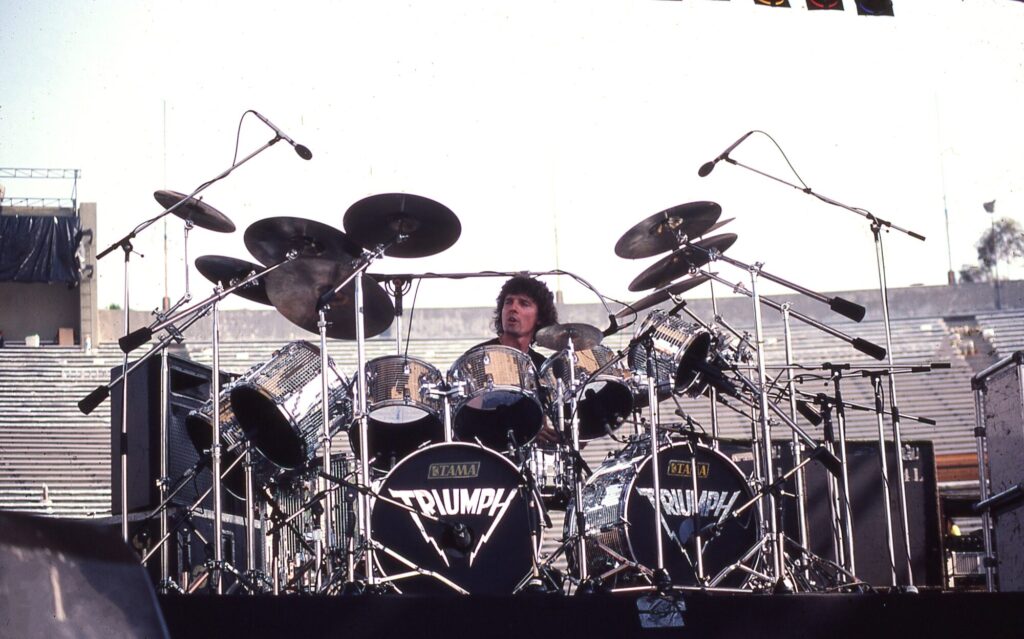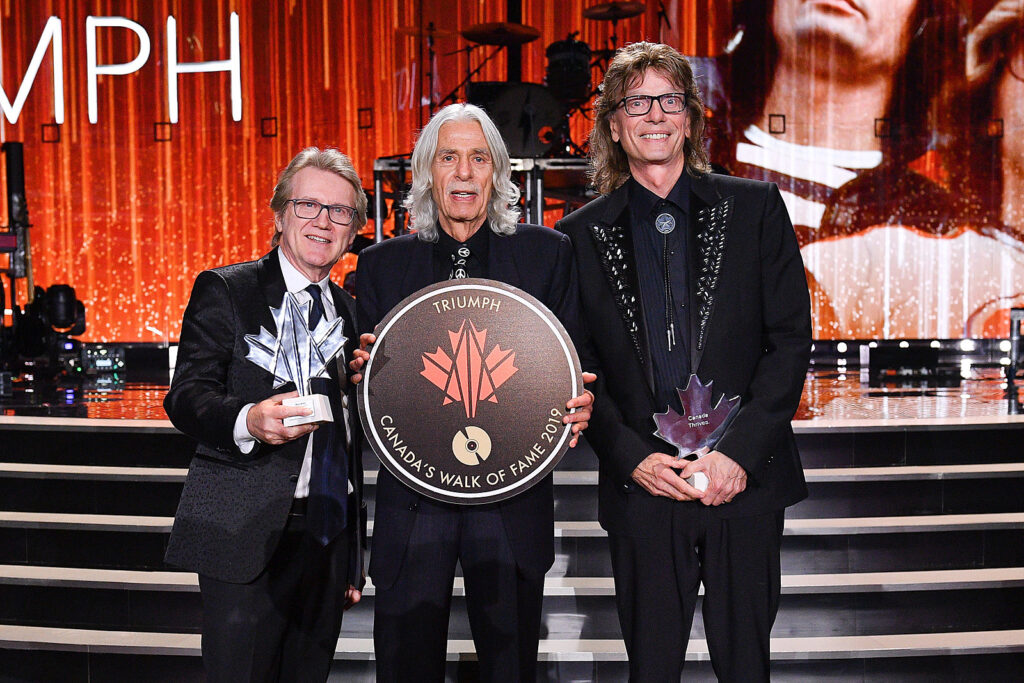Listen up: in 1975 as the City of Mississauga was finding its rhythm, a trio of long-haired rockers came blasting out of the ‘burbs.
Triumph.
Guitarist Rik Emmett with his distinctive voice, Mike Levine on bass and keyboards and drummer Gil Moore sharing lead vocals.
The band brought together elements of hard rock, progressive rock, and heavy metal to create a sound that dominated Canadian rock stations through the 70s and 80s.
Triumph had it all.
Anthemic rock ballads, like Magic Power, Lay it on The Line and Follow Your Heart, a dedicated fan base, and fiery live performances.
Literally.
A Triumph live show wasn’t complete without pyrotechnics.
Between 1975 and 1988, the trio released nine studio albums and toured the world on the strength of their unique blend of hard-driving hits.

Triumph came blasting out of the ‘burbs and wrote some of Canada’s most anthemic rock songs. (Photo courtesy of Mississauga’s Legends Row)
But that wasn’t the only way they set themselves apart from their peers.
In 1978 the guys built their own recording studio back home in Mississauga, which they used to create their albums, and when they weren’t using it, they rented it out to other bands.
Gil Moore loved it. The drummer had always enjoyed the technical aspects of music making and Metalworks gave him the space to play. What started out as a private project for the band, quickly grew into a recording hub for other artists.
By the mid-1980s, Metalworks was rockin’ just as the band was starting to come apart.
Triumph’s record label wanted a more pop-infused album. They guys tried but it didn’t feel right. In 1987, Gil, Rik and Mike recorded the album Surveillance, an attempt to get back to their heavy rock roots but it wasn’t enough to keep the trio together.
The following year Rik left the band. Gil and Mike tried to keep going, picking another guitarist for one final album and tour before Triumph hung it up for good in 1993.
That’s when Gil turned his attention full-time to Metalworks.
With Triumph Gil Moore toured the world; with Metalworks, Gil brought the world to the central Mississauga studio.
Metalworks Studio’s growth is a testament to Moore’s vision.
Under his leadership, it evolved into Canada’s preeminent studio, distinguished by an astonishing 17-time recognition as Canada’s Studio of the Year.
The studio’s walls are lined with awards and platinum records, a testament to the magic that has been produced within them.

Triumph drummer and co-founder Gil Moore on stage and ready to rock. (Photo courtesy of Gil Moore)
Today Metalworks is Canada’s largest music studio and the go-to recording space for some of the biggest names in music.
Drake, Lil Wayne, Katy Perry, the Jonas Brothers, Sade, Prince, Tina Turner, David Bowie, The Cranberries, Ashlee Simpson, D12, Guns N Roses, Silverchair, Bruce Springsteen, NSYNC and Christina Aguilera have all recorded here.
So has just about every major act to come out of Canada in the last 30 years.
Sum 41, Feist, K-OS, Sam Roberts, Billy Talent, Barenaked Ladies, Metric, Johnny Reid, Simple Plan, Tom Cochrane, Our Lady Peace, Tea Party, Bachman-Cummings, Nelly Furtado, Anne Murray and Triumph’s cross-town prog rock friends Rush have all made music at Metalworks.
With an eye toward the future and a commitment to nurturing the next generation of music industry professionals, Moore established Metalworks Institute in 2005.
The training centre was a natural extension of the studio, designed to equip students with the knowledge and skills necessary to excel in an ever-evolving industry.
Under Moore’s guidance, the institute has become renowned for its superior curriculum, state-of-the-art facilities, and a philosophy that emphasizes respect, mentorship, and balanced life values.

Triumph co-founders Guitarist Rik Emmett, bassist and keyboardist Mike Levine and drummer Gil Moore were inducted into Canada’s Walk of Fame in 2019. (Photo courtesy of Gil Moore)
You can hear more stories about the people and events that helped shape Mississauga via our podcast, We Built This City: Tales of Mississauga, available on your favourite podcast platform or from our website.
